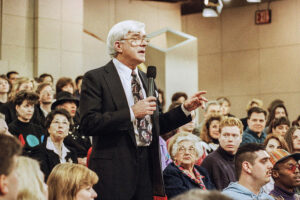 Phil Donahue, whose 29-year, groundbreaking talk show spanned from the late 60s to the late 90s, died a few weeks ago at the age of 88. Headlines called him a talk show icon, a free speech champion, a pioneer. His New York Timesobituary dubbed him the king of daytime television.
Phil Donahue, whose 29-year, groundbreaking talk show spanned from the late 60s to the late 90s, died a few weeks ago at the age of 88. Headlines called him a talk show icon, a free speech champion, a pioneer. His New York Timesobituary dubbed him the king of daytime television.
When Donahue began his show in Ohio in 1967, Lyndon Johnson was president, the Vietnam War was in its twelfth year, the first Super Bowl was played, Aretha Franklin released “Respect,” the Big Mac was created, and Elvis and Priscilla Presley married.
My mother was 32; I was in fifth grade.
His progressive, hourlong show aired in the late afternoon, just as my sibs and I returned home from school. We went to our rooms to change out of our school uniforms. Mom folded laundry in the Florida room as Donahue interviewed his guests, deftly questioning them about atheism, prayer, child sex abuse, mental health, AIDS education, voting rights, anti-war protests, politics.
Mom was a huge fan. The show was on in our house almost every afternoon, the volume higher than usual. When I first registered who he was and what he was doing, his show was grownup background noise. Blah blah blah. But as I aged into my teens, I began sitting on the couch with my mother from time to time, and we watched and listened together. Sometimes Mom would stare at the screen almost transfixed, a towel or sheet in her hands, frozen in mid-fold. When I think back to that picture I have of her in my mind from those times, I imagine her as jolted by a new perspective, the wheels in her head cranking to open her mind wider and wider.
Donahue is best known in the annals of American television for recasting the talk show from vaudeville to town hall. He moved taboo to the TV screen and exonerated it through clear-eyed questions and civil conversation. He deployed a respectful, direct interviewing style, and his show tilted more toward education than entertainment, though I clearly remember the show on male strippers. I had just hit adolescence. The men glistened and stripped down to their skimpy bits; the audience whooped and cackled. I’m pretty sure I quivered.
Donahue also shifted the role of the studio audience from passive listener to active questioner, assuming their intelligence and never dumbing down for a guffaw or some low-hanging ratings points. He empowered the live and call-in audience to exercise their curiosity, to speak their minds, to probe for the answers they needed. It was groundbreaking then; and it was thrilling.
My most vivid visual memories of Phil Donahue are that he had a lot of hair, he dressed like my junior high school principal, and he sprinted up and down the steps of the television studio, taking questions and comments from his largely female audience. He outstretched his arm toward the willing audience member with a long, skinny microphone that looked like the baton I used to twirl when I dreamed of being a majorette.
What I remember more viscerally is what my mother told me toward the end of her life. We had spoken about the Donahue show occasionally over the years. I knew of her affection and admiration. About six years ago I started interviewing her about all aspects of her life, as if she were part of an oral history project. We were in her living room talking about people we thought were strong forces in our lives. I jotted notes as she spoke. I asked her to talk about teachers who made a lasting impact. Without hesitation she said: Phil Donahue. I consider Phil Donahue to be one of the most powerful teachers I’ve ever had. “He opened my eyes to the world. He helped me to wake up.” She said Donahue brought her into the world outside, a world of big ideas.
My mother died eight months ago. Her death has released me to think about her entire life, the length and breadth of it. I sift through photographs and reread some of her letters; seeing her handwriting is a thing of startling comfort. When I heard of Donahue’s death, my thoughts went immediately to my mother. I thought of her and I sitting on the sofa all those years ago, listening together, so giddy to be in on the conversation, so eager to be part of the world out there.

